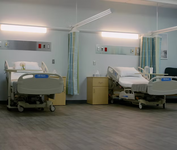Within each foot, there are around 200,000 nerve endings with an incredible level of responsivity - granting them the ability to communicate vital information directly to the brain. Whether it's for balance, assessing pressure, or calculating the temperature of any environment, the feet represent one of the most crucial sensory organs of the body. With this in mind, HapTech Holdings Inc. (HTH), a leading health-tech enterprise based in California, introduces groundbreaking technology that offers an array of holistic solutions, through audio-haptics transmitted via the feet. The result: enhanced outcomes for various health and wellness treatments, particularly in cases of PTSD, anxiety, and trauma-related disorders.

To reach this groundbreaking solution, co-founder and CEO Brent Williams combined his wealth of expertise in the consumer goods sector with therapist and psychologist Dr. Stephen Dansiger, a specialist in trauma-focused care. HTH technology converts audio signals into sensations - or haptics - that can be felt throughout the body, deactivating the body’s natural fight or flight response, calming the nervous system, promoting heart rate variability, and ultimately, grounding the patient.
The implementation of such technology in the healthcare sector has benefits that extend further than patient outcomes. For those suffering from longer-term complications - like complex mental health issues - both patients and therapists are increasingly at risk of experiencing burnout.
Brent states, “Through our technology, patients can accelerate their journey to recovery. Rather than staying in therapy for extended periods and increasing the chances of patient or therapist burnout, our technology could hold the key to unlocking greater effectiveness of healing.”
External studies relating to PTSD suggest a disproportionate risk for US veterans compared to the general public - with 12.9% of veterans diagnosed in 2017 alone, compared to 6% of civilians diagnosed in the same year. As PTSD and other mental health issues continue to pose a concern for individuals across the region, HTH recognizes a growing gap within this space, targeting its solutions toward some of the most underserved portions of American society.
Internal listening sessions hosted by HTH revealed a decrease in stress levels post-intervention, across a cohort of twenty participants, including both clinicians and the general public. Quantitative analysis revealed that approximately 68.75% of all participants experienced a decrease in stress of at least 50%. The study underscored the potential of targeted listening sessions as a non-invasive, accessible intervention for stress reduction in both clinicians suffering from burnout and individuals with anxiety. The substantial decrease in stress levels suggested that such approaches could be beneficial in managing stress and improving the overall behavioral health of affected populations.

HapTech’s Foot Pedestals
Now with 16 active patents and a growing demand for innovative health-tech solutions, HapTech Holdings Inc. paves the way for a more health-conscious population while relieving strain on the contemporary healthcare system. Its flagship products include insoles, slides, pedestals, and floor mats, used in a range of diverse applications, from technology and healthcare to the world of entertainment.
To learn more and stay up to date with HTH’s latest innovations, click here.
Media Contact
Name: Brent Williams
Email: [email protected]






